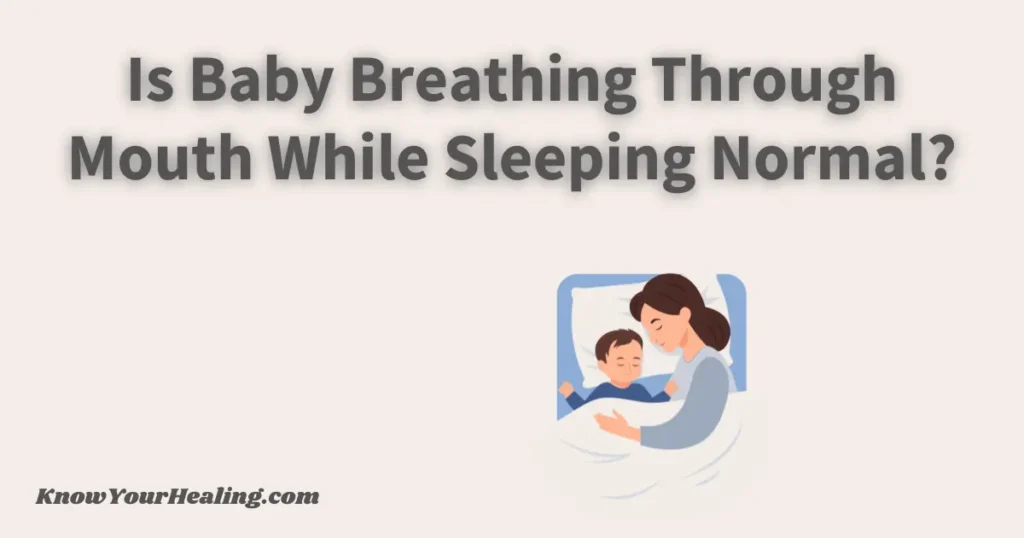Baby breathing through the mouth while sleeping can concern many parents. It may be more than just a simple habit; it could signal underlying issues like nasal blockages.
Understanding why this happens and knowing when to seek help can make all the difference.
Babies typically breathe through their noses, as it’s more efficient and helps filter and humidify the air. When a baby consistently breathes through the mouth during sleep, it might indicate a blockage in the upper airway.
Parents should learn the signs of potential problems and when to consult a healthcare professional.
Exploring the reasons behind mouth breathing can help ease parental worries and guide them to proper solutions.
Understanding when this behavior is normal and needs attention empowers parents to ensure their child’s well-being.
Normal Infant Breathing Patterns

Young babies often display unique breathing patterns that can surprise new parents.
Nasal breathing is essential. Infants are obligate nasal breathers who rely on their baby’s nose for respiration.
They might occasionally show open-mouth breathing if they have a stuffy nose, but this should not be persistent.
Infants breathe at varying speeds. A typical newborn baby’s breathing rate can range from 30 to 60 breaths per minute and may slow down to 20 when they sleep.
It’s common for them to have irregular breathing with short pauses and periods of quick breaths.
Irregular breathing might involve the young baby’s belly moving more than the chest, which is typical due to their diaphragmatic breathing.
If a baby sleeps with their mouth open often, it might lead to a dry mouth and could signal nasal congestion.
Persistent mouth breathing might suggest issues like nasal obstructions or a deviated septum.
These conditions can affect a child’s facial development and oral health, leading to problems such as dental issues or open bites.
A healthcare provider should evaluate frequent mouth breathing in sleeping babies.
Addressing nasal congestion with a bulb syringe or saline drops could help clear the nasal passages.
Healthcare professionals may recommend further treatment options if an underlying medical condition impacts the child’s breathing patterns.
Regularly monitoring a child’s breathing, especially during sleep, is important for identifying potential sleep disorders.
Early detection and assistance from a child’s doctor ensure healthy development.
Causes of Mouth Breathing in Babies

Baby breathing through the mouth while sleeping is often due to nasal blockages or other medical conditions. A stuffy nose, enlarged tonsils, or nasal obstructions can all cause this behavior.
Addressing these issues early is vital to prevent potential long-term effects on a baby’s health.
Common Cold and Nasal Congestion
A common cold often leads to nasal congestion, making it difficult for babies to breathe through their noses.
Mucus can easily block infants’ tiny nasal passages, resulting in mouth breathing as a compensatory mechanism.
Parents might use a bulb syringe or saline drops to help clear the baby’s nose.
Ensure the baby’s environment is free from irritants, and keep a cool mist humidifier nearby to help relieve congestion.
Enlarged Adenoids and Tonsils
Enlarged adenoids and tonsils can obstruct the upper airway, affecting breathing patterns. This condition prompts a baby to become a mouth breather, particularly at night.
Consulting a healthcare provider is a good idea if a baby consistently exhibits these symptoms.
This condition is linked to health issues such as obstructive sleep apnea.
Treatment options like surgery might sometimes be necessary to improve nasal breathing and alleviate symptoms.
Deviated Septum and Nasal Obstruction
A deviated septum is a structural problem in the nose that can cause nasal obstruction. This leads to chronic mouth breathing as babies find it hard to breathe through their nose.
Such obstructions may require an evaluation from healthcare professionals to determine if medical intervention is needed.
Addressing this issue can help in avoiding potential developmental problems in young children.
Allergies and Environmental Factors
Allergies are a significant cause of nasal congestion in young babies.
Allergens can irritate the nasal airway, leading to a stuffy nose.
New parents should consider limiting exposure to common allergens like dust and pet dander and may use a neti pot or saline rinse to alleviate symptoms.
Keeping the living space clean and using air purifiers can also reduce allergic reactions and ensure better nasal breathing in infants.
Effects of Chronic Mouth Breathing
Chronic mouth breathing, especially in young children, can lead to various health issues, affecting oral health, facial structure, and overall well-being.
Understanding these effects is vital for new parents and healthcare providers alike.
Oral Health Implications
Chronic mouth breathing in children can have several adverse effects on oral health.
When a child breathes through their mouth regularly, it can lead to a dry mouth, which reduces saliva production.
Saliva is essential for washing away bacteria and neutralizing acids. Without it, children are more prone to tooth decay and gum disease.
Open mouth breathing can also cause bad breath and increase the risk of oral infections.
This breathing pattern can alter the tongue’s position, affecting the teeth’ growth and the mouth’s roof.
Young children with persistent mouth breathing should be evaluated for any underlying issue affecting their nasal passages or leading to nasal congestion.
Facial Development Concerns
Breathing through the mouth instead of the nose can also impact a child’s facial development.
Mouth breathing can cause children to develop a long face syndrome or narrow face over time.
This occurs because constantly breathing through an open mouth can change the position of the jaw and tongue, affecting the facial structure.
In some cases, children might develop an open bite, where the upper and lower teeth do not meet adequately.
These changes are not just aesthetic; they can lead to orthodontic issues that require treatment.
New parents should be aware of these potential issues and consult a healthcare provider if they notice their young babies frequently breathing through their mouths.
Adverse Impact on General Health
Aside from oral and facial concerns, chronic mouth breathing can also affect general health.
Nasal breathing is vital for filtering and humidifying the air. When mouth breathing replaces it, this can increase the risk of respiratory infections and sleep disorders like obstructive sleep apnea.
Children may experience restless sleep and daytime sleepiness due to disrupted sleep patterns.
This can lead to behavioral problems and even attention deficit hyperactivity disorder.
It is crucial to address the underlying issue, such as a stuffy nose or nasal obstructions, with appropriate treatment options, such as nasal strips or consulting a healthcare provider.
Connection Between Mouth Breathing and Sleep Quality

Mouth breathing during sleep can impact the quality of rest. It is linked to several sleep-related concerns, such as snoring, irregular sleep patterns, and other disorders that disrupt healthy sleep.
Snoring and Sleep Apnea
Mouth breathing can lead to snoring due to airflow disruptions in the upper airway.
It may also be related to obstructive sleep apnea, a condition in which the airway becomes blocked repeatedly during sleep.
Babies who breathe through their mouths might experience restless sleep and daytime sleepiness.
This pattern of open-mouth breathing in children can sometimes be an early sign of underlying health issues.
A healthcare provider might suggest examining the baby’s nose and throat for possible causes, such as nasal obstructions or enlarged tonsils.
Impact on Sleep Patterns
Chronic mouth breathing in babies can negatively affect their sleep patterns.
Frequent mouth breathing may cause a dry mouth, leading to discomfort and waking during the night.
This irregular breathing can interrupt the natural sleep cycle, causing a lack of restful sleep.
Children may become irritable or exhibit behavioral problems due to inadequate rest.
Nasal congestion can exacerbate these issues, making nasal breathing difficult.
Treating nasal blockages or allergies may help restore nose breathing, improving the quality of the child’s sleep.
Other Sleep-Related Disorders
Mouth breathing is associated with other sleep-related disorders in young children.
Due to a dry mouth environment, it may contribute to oral health issues, such as gum disease and tooth decay.
Over time, persistent open-mouth breathing can affect facial structure and development.
The risk of developing long-term health issues increases if the underlying problem is not addressed.
Parents should consult a child’s doctor to explore treatment options.
Interventions like using a nasal aspirator or saline drops to clear nasal passages can be a good idea to support better sleep hygiene.
Identifying and Diagnosing Mouth Breathing in Infants

Baby breathing through the mouth while sleeping can indicate underlying health issues, such as nasal congestion or airway obstruction. Understanding when to seek medical advice and who to consult can help ensure proper care and treatment.
When to Visit a Pediatrician
Persistent mouth breathing in infants may require a visit to a pediatrician.
New parents should watch for signs such as a stuffy nose, dry mouth, frequent snoring, or noticeable difficulty in breathing.
A bulb syringe can help clear nasal passages if the baby’s nose appears blocked.
However, if this doesn’t resolve the issue or if restless sleep or daytime sleepiness occurs, it’s a good idea to consult a doctor.
Healthcare providers can identify health conditions like obstructive sleep apnea.
They will assess other symptoms and may perform a physical examination to check for nasal obstructions or an open bite, which could indicate facial structure or airway concerns.
Assessment by a Pediatric Dentist
A pediatric dentist can evaluate if mouth breathing affects the child’s oral health.
They will check for tooth decay, gum disease, or changes in the roof of the mouth.
An open mouth posture can lead to dental problems and affect facial development.
Dentists may also determine whether chronic mouth breathing is caused by a misaligned child’s jaw or a deviated septum.
They might suggest solutions such as using nasal strips to aid nasal breathing.
Early dental evaluation is essential if a newborn baby exhibits signs of being an obligate nasal breather.
Comprehensive Health Evaluation
If mouth breathing persists, a more in-depth evaluation from a healthcare professional is necessary. This involves assessing for medical conditions like sleep disorders, potential structural issues like a narrow face, or genetic conditions that might affect breathing.
Professionals might use imaging like X-rays to view the nasal airway and airway obstruction. Treatment options for identified issues may include addressing respiratory infections or considering orthodontic treatment.
Prompt diagnosis helps improve young children’s overall health and well-being.
Developing Proper Breathing Habits

Nasal breathing plays a crucial role in a baby’s development and health.
Establishing good breathing habits early can prevent issues related to mouth breathing, such as dry mouth and sleep disorders.
Addressing these habits involves understanding how breastfeeding, tongue posture, and specific retraining methods contribute.
Breastfeeding Benefits
Breastfeeding promotes nasal breathing in young babies. It encourages the baby’s tongue and jaw to move forward and upward, strengthening the muscles needed for proper nasal breathing.
This activity helps maintain an open nasal airway, reducing the chances of chronic mouth breathing and potential issues like obstructive sleep apnea.
Understanding the connection between breastfeeding and nasal breathing can be reassuring for new parents when they notice their baby developing good breathing patterns.
Breastfeeding also supports healthier facial development by preventing habits that lead to open-mouth breathing.
Addressing Tongue Posture
Tongue posture plays a vital role in a child’s breathing patterns. When the tongue rests on the roof of the mouth, it promotes nose breathing and helps prevent mouth breathing while sleeping.
An improper tongue posture can lead to chronic mouth breathing and other health concerns such as irregular breathing.
Parents concerned about poor tongue posture in their child should consult a healthcare provider for guidance.
Techniques to improve tongue posture may involve various exercises and guidance on positioning the tongue during rest and activity.
Developing proper tongue position significantly prevents long-term issues related to mouth breathing.
Breathing Retraining Techniques
Nasal obstructions and other potential causes of mouth breathing may require specific breathing retraining techniques.
Techniques such as using nasal strips, saline rinses, or bolstering nasal passages with a bulb syringe can help alleviate nasal congestion. These strategies support transitions from mouth-to-nose breathing.
Younger children who consistently breathe through their mouths may benefit from these techniques to enhance their nasal breathing skills.
It is advised to consult with healthcare professionals about treatment options for structural issues, such as a deviated septum.
These interventions are essential for improving sleep quality and overall health.
Treatment and Management Options
Parents can be concerned about open-mouth breathing in a sleeping baby. The following sections provide medical and home-based solutions for managing this condition effectively.
Medical Interventions
Healthcare providers may recommend medical interventions for persistent mouth breathing. Nasal obstructions or enlarged tonsils often require professional assessment.
Persistent nasal congestion may lead to a recommendation for a nasal spray or saline drops to clear the baby’s nose.
In some instances, surgery might be suggested to correct anatomical issues like a deviated septum or enlarged adenoids.
Obstructive sleep apnea is another condition that sometimes requires medical attention to improve the child’s breathing during sleep.
Home Remedies and Lifestyle Changes
Home remedies play an important role in managing occasional mouth breathing.
Using a bulb syringe to gently clear a stuffy nose in younger children can be a helpful first step.
A cool mist humidifier can moisten the air, making nasal breathing easier for a sleeping baby.
Encouraging the use of nasal strips can also assist in opening up the nasal passages.
Ensuring the baby’s sleep environment is clean and free of allergens is vital to decreasing the chances of respiratory infections and increasing nose breathing.
Long-Term Management Strategies
Long-term management includes strategies such as monitoring the child’s oral health to prevent issues like tooth decay and ensure proper facial development.
Consulting with healthcare professionals may highlight underlying issues if a newborn baby frequently breathes through the mouth.
In young children, behavioral problems or restless sleep could be symptoms related to chronic mouth breathing.
Interventions like orthodontic treatment can sometimes be required to address issues related to open bites and to ensure healthy facial structure.
Regular check-ups with a child’s doctor can help track and manage the child’s condition effectively.
Final Thoughts
Baby breathing through the mouth while sleeping can be a cause for concern. Observing the baby closely and looking for any other symptoms that may indicate an underlying issue is essential.
While occasional mouth breathing might not be alarming, consistent patterns should prompt a discussion with a pediatrician.
Signs to Watch For:
- Snoring or noisy breathing
- Frequent waking during the night
- Dry mouth or lips
Mouth breathing may result from a blockage in the nasal passages or other respiratory issues. In such cases, a healthcare professional’s input is crucial to determining the right action.




